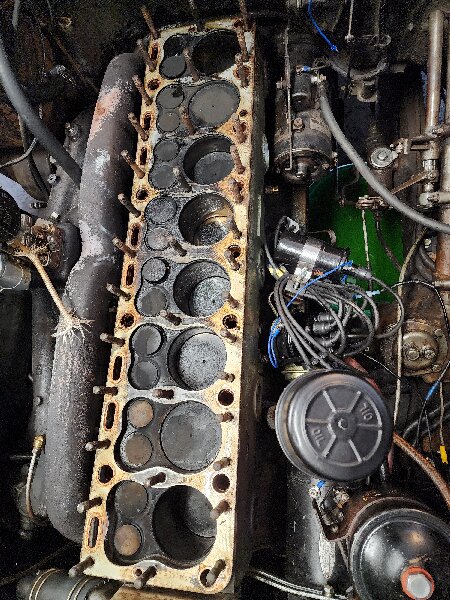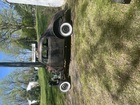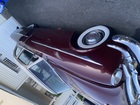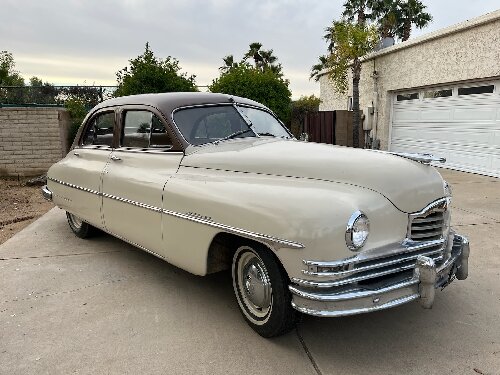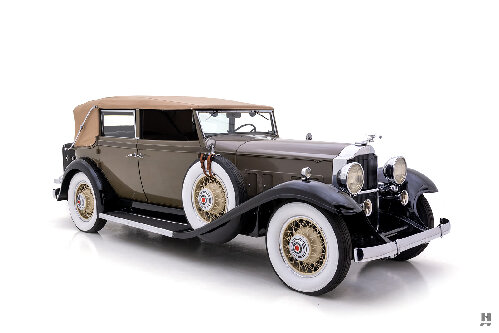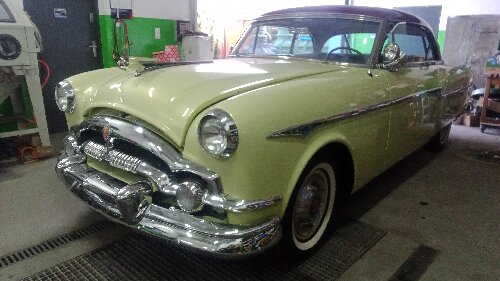|
Re: Hydraulic Lifter Tick
|
||||
|---|---|---|---|---|
|
Just can't stay away
|
Digging into disassembly.
Posted on: 1/12 14:49
|
|||
|
||||
|
Re: Hydraulic Lifter Tick
|
||||
|---|---|---|---|---|
|
Home away from home
|
Quote:
Been there done that!!! How do your cylinder walls look? I think with the amount of build up you should pull your pan again and pull your pistons. You might have rings that are stuck, and rings are inexpensive, you could clean your pistons and throw a new set in. Might as well keep going down the rabbit hole! LOL It would also allow you to check your wrist pin bushings, although I don't think your noise is a bad bushing, but engine noises are funny things. Might as well check your piston clearance as well. Mine were a bit loose so I had them coated. By the time you're done she's going to purr like a kitten! Keep posting updates!
Posted on: 1/12 15:00
|
|||
|
||||
|
Re: Hydraulic Lifter Tick
|
||||
|---|---|---|---|---|
|
Just can't stay away

|
That is my point, use the 10 weight only if you want to go ice road trucking.
Posted on: 1/13 7:42
|
|||
|
||||
|
Re: Hydraulic Lifter Tick
|
||||
|---|---|---|---|---|
|
Home away from home
|
Modern 10W30 oil will behave much like a 10W straight grade WHEN THE ENGINE IS COLD. This is all to the good in cold weather, and at start-up. When the engine is up to operating temperature, 10W30 oil will behave much the same way as would a 30W straight grade at operating temperature. This, again, is all to the good.
Old engines can be destroyed by running heavy oil in very cold weather. Ford recommended the equivalent of 20W for the Model T Ford for general use, and insisted on a quality oil with a low cold test. In very cold weather, 10W oil or adding kerosene to thin the oil was recommended. Chevrolet recommended 20W in summer for their 6 cylinder engines and 10W in winter, and under extreme conditions, 10W with 10% kerosene added. This advice can be found in Chevrolet owners manuals as late as 1949. Packard engines were designed with ample bearing areas and featured full pressure oiling to all critical parts. But they still benefit from oils that perform well at low temperatures as well at as operating temperatures and hot summer conditions. Modern, quality multi-grade oils meet and exceed that requirement, and have high film strength and many other advantageous characteristics that make them far superior to straight grade, non-detergent oils for use in older engines, including Packards. I run 5W30 synthetic in a Model T Ford with excellent results in 100F+ temperatures at speeds above 40 MPH. The previous owner ran the same car and same engine in several Montana 500 races using 0W20 synthetic oil. He posted average speeds in the 53 to 54 MPH range over the 500 mile open road course. He finished every race he entered. I've run the same car around 14,000 miles using 5W30 synthetic oil at speeds in the 35 to 45 MPH range with no issues whatever. That's remarkable performance for a Model T engine that is stock except for a high lift cam. Automobile engines need high quality motor oil, not grease!
Posted on: 1/13 9:32
|
|||
|
||||
|
Re: Hydraulic Lifter Tick
|
||||
|---|---|---|---|---|
|
Home away from home
|
The engine in the picture appears to have patches of carbon on the cylinder walls. (May be a reflection)
If the dark areas on the cylinder walls are in fact carbon, That indicates stuck rings or possibly excess wear. Stuck rings can occur even in low mileage engines. There should be no carbon on the cylinder walls except for a narrow ring at the very top of the bore.
Posted on: 1/13 9:38
|
|||
|
||||
|
Re: Hydraulic Lifter Tick
|
||||
|---|---|---|---|---|
|
Home away from home
|
Quote:
Agreed. Too many of these vintage cars sit for long periods of time, and then when they do get taken out it's only to go get ice cream. Need to get out on the road and go for a nice cruise every now and then to keep them from getting like this.
Posted on: 1/13 10:15
|
|||
|
||||
|
Re: Hydraulic Lifter Tick
|
||||
|---|---|---|---|---|
|
Home away from home
|
Fortunately it appears to (mostly) just be a reflection, as the actual carbon ring is visible on some inspection. Though the overall carbon buildup is still of concern.
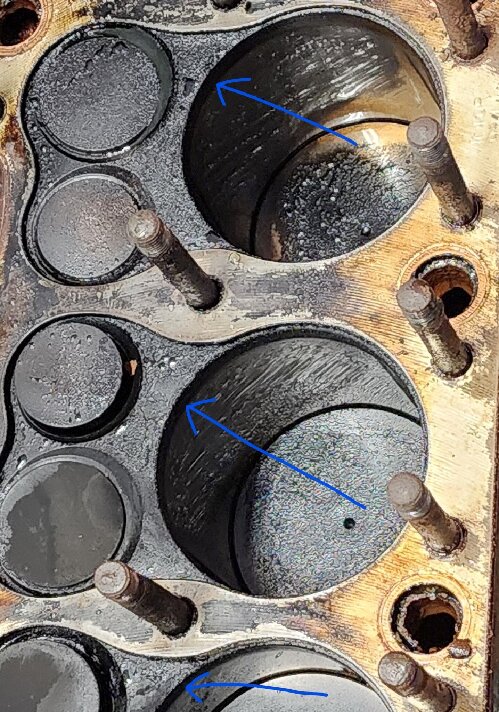
Posted on: 1/13 11:04
|
|||
|
'55 400. Needs aesthetic parts put back on, and electrical system sorted.
'55 Clipper Deluxe. Engine is stuck-ish. |
||||
|
||||
|
Re: Hydraulic Lifter Tick
|
||||
|---|---|---|---|---|
|
Home away from home
|
Quote:
Did you ever do a vacuum test on your engine? One possibility is you have worn valve guides and your engine has been ingesting some oil. Was the exhaust a bit blue/smoky? Probably didn't put on enough miles to know if it was actually using oil. As previously mentioned, stuck or worn rings could be a culprit as well. Once you get some springs off you check and see if you can wiggle the valve in the guide, clearance is only a few thou, with exhaust being a couple thou more. Service manual will say exactly, but I think it's .003 and .005. Best to measure them so you know for sure. Good chance you'll find valve stems with wear on one side and valve guides with a bit of an hour glass shape. Ask me how I know! LOL Keep going! Once you get everything apart, measured, tested and cleaned, you'll know just what needs to be done and then you can start putting it back together, which is the fun part!
Posted on: 1/13 14:32
|
|||
|
||||
|
Re: Hydraulic Lifter Tick
|
||||
|---|---|---|---|---|
|
Home away from home
|
I had a 1951 Henney-Packard combination (5-main 327 with hydraulic lifters) that had an odd sound that seemed to be something between a lifter tap and a knock. After disassembly (in the car), checking and cleaning the lifters as needed, resurfacing the bottoms of the lifter bodies and properly checking the valve stem clearance (lapped the valves while I was at it), the sound persisted. The engine idled quietly and ran quietly as it did before but when gunning the throttle, the sound was there. I finally found a clue in an old Motor’s Manual that it was something called rod alignment which I had never heard of before. Had I removed the rods and taken out the wrist pins, then laying each one on its side on a flat surface and checking the distance to the surface at the wrist pin end, one of them would not have had the same distance. Apparently it’s not quite the same as a bent rod.
Obviously your issue is a lifter but I wanted to share that there are other things that can make similar sounds.
Posted on: 1/13 16:54
|
|||
|
||||

 327 Oil.JPG (25.15 KB)
327 Oil.JPG (25.15 KB)
 327 oil 2.png (11.52 KB)
327 oil 2.png (11.52 KB)
